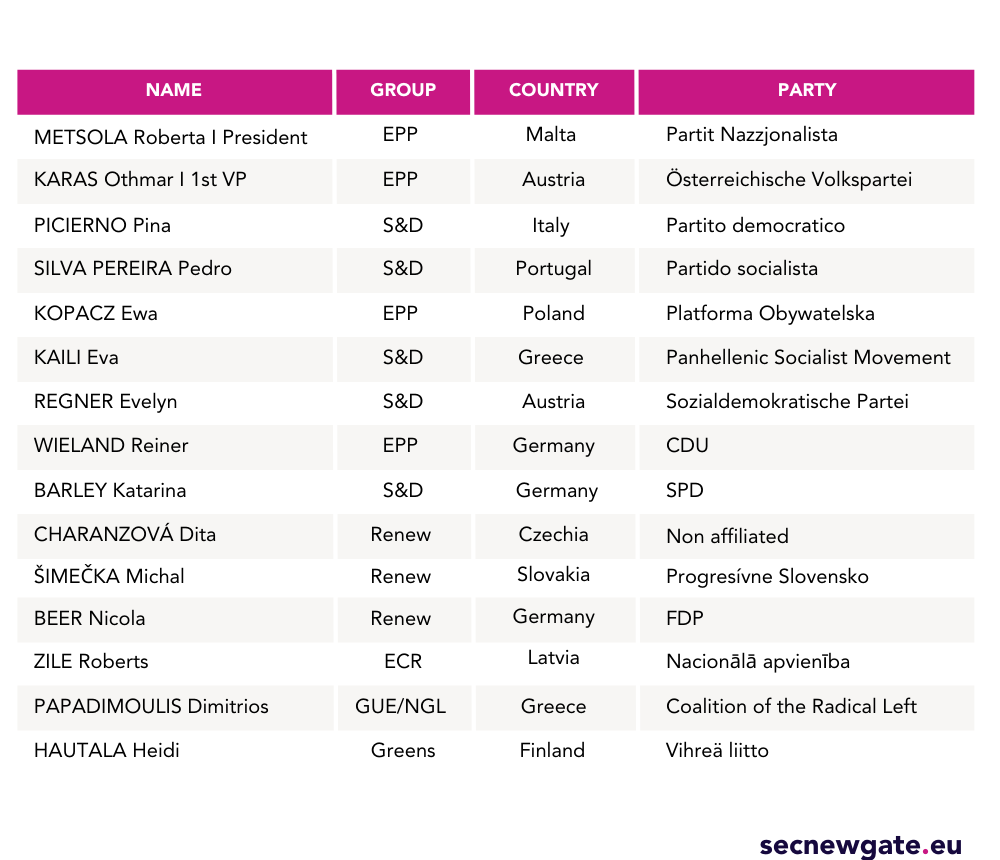European Parliament President and Vice-Presidents election.
On 18 January the Maltese EPP MEP Roberta Metsola was elected as the new President of the European Parliament. Following the election of the President of the Parliament, MEPs elected the 14 Vice-Presidents of the Parliament and the five Quaestors (responsible for the running of Parliament). This group, along with the President herself, comprise the Parliament’s Bureau.
Vice-Presidents elections.
Overall, the leadership roles in the Parliament still reflect the political composition of the European Commission. Among the elected Vice-Presidents, 5 are from S&D, 3 from EPP, 3 from Renew, 1 from Greens, 1 from ECR and 1 from GUE/NGL. The ID and NI groups were not elected to any VP role. Previously, the Italian 5 Star Movement held one of the EP Vice-presidencies but that is gone now.
On the other hand, another smaller political group, the ECR, gained one seat: Zile’s election might represent a shift in approach from the political majority in the Parliament and a move away from supporting the Greens and GUE/NGL towards the conservatives in the ECR group.
Newly elected EP President and Vice-Presidents.

Political agreement/power balances behind the elections.
Metsola’s election is the result of a last-minute powers sharing deal between the three main groups (EPP, S&D and Renew). S&D leaders agreed to back her in return for a commitment on political priorities with the EPP and Renew Europe. The S&D has also assured five of the Parliament’s 14 vice-presidential slots and the head of the Conference of Committee Chairs, traditionally held by the EPP. This position is crucial to coordinating the European Parliament’s various panels. A further point in the agreement could be the attribution to S&D of the presidency of a future Covid-19 special committee. On the other hand, the Greens have been excluded from the deal. The Greens have accused the biggest groups of disregarding their views and that of other smaller groups.
This agreement, which distributes several important positions to the S&D group may reflect a new dynamic within European politics where the centre left is in the ascendancy. The S&D has surpassed the EPP in the latest election polls.
Moreover, the first half of this legislative term shows a decrease in power for the EPP, as its members won fewer votes than MEPs from Renew Europe and S&D: thus, S&D, and in particular Renew, have been closer to the heart of political bargaining, compared to the EPP.
Among other topics in the abovementioned agreement there is the application of the Rule of law conditionality regulation (which links the attribution of EU funds to the respect of the rule of law), the Digital strategy, the attribution at EU level of more competences in the healthcare field, the Strategic compass (to enhance EU strategic autonomy in foreign affairs) and the Global gateway (a plan to develop infrastructure abroad), the Pact of Migration, the strengthening of the Frontex mandate, the election of the European Parliament through transnationals lists.